Sexual Misconduct Response Centre Annual Report 2021-2022
Emerging needs, responsive growth
Making a difference
"The support provided by the RSC program has been critical to my well-being and recovery after experiencing sexual misconduct. The standard of care and professionalism is extremely high and I'm forever grateful."
"It's hard to put into words how grateful I am for the services of SMRC and how readily available my coordinator was for me."
"I have been a client with SMRC since December 2019. Calling them was the best decision I have ever made as it has completely changed my life for the better... I was very isolated and felt alone prior to contacting SMRC. And now I have become a much more confident and less angry person through these years of support."
Message from the Chief Operating Officer
Against the backdrop and impact of the ongoing global pandemic throughout the 2021-2022 fiscal year, the Sexual Misconduct Response Centre (SMRC) team remained committed to supporting the Defence community as a recognized centre of expertise on sexual misconduct.
Following the Budget 2021 announcement of $59.7 million to expand the SMRC's support services, the SMRC team rose to the challenge with grace and professionalism. Although the expansion of the SMRC's mandate and services is undeniably needed to effectively support the survivor community, it has understandably come with growing pains as we managed exponential growth in our budget and organizational chart.
In the fourth quarter, SMRC responded to a sharp increase in demand for support services as a result of new allegations of misconduct that were brought forward by public service employees and current and former members of the Canadian Armed Forces (CAF). This was a time of heightened emotions for the entire Defence community and the SMRC played a key role in supporting survivors and affected individuals and lending expertise to those responding.
Looking ahead, the SMRC is committed to responsive growth in order to deliver the programs and services that are needed by the Defence community to address sexual misconduct. We welcome the recommendations made by Mme Arbour in the Report of the Independent External Comprehensive Review (IECR) into Sexual Misconduct and look forward to addressing them with a view to making an even greater impact in our work.
It is a privilege to step into the leadership role at SMRC after years of dedication by retired Executive Director Denise Preston. The work that the SMRC team has accomplished to date, while navigating significant changes and amid an ongoing pandemic, is inspiring. Although the path ahead remains challenging, I will work hard to support SMRC as we continue to meet the emerging needs of those affected by military sexual trauma and ultimately eliminate sexual misconduct in the CAF and the Department of National Defence (DND).
Linda Rizzo Michelin
Chief Operating Officer
Sexual Misconduct Response Centre
About the SMRC
Established in 2015, the SMRC provides support services to currently serving and former members of the CAF and to DND public service employees who are affected by sexual misconduct.
Mandate
Support services: For current and former CAF members, DND public service employees and staff of the non-public funds, affected by sexual misconduct
Centre of expertise: Guidance to CAF and DND on all aspects of sexual misconduct
Monitoring and oversight: Tracking and supporting CAF and DND progress in addressing sexual misconduct
The SMRC's initial mandate was to provide confidential support to CAF members who were affected by sexual misconduct.
In 2019, the SMRC's mandate was expanded, adding responsibility for providing expert advice and guidance and monitoring progress in addressing sexual misconduct in the CAF.
Budget 2021, released on 19 April 2021, outlined numerous priorities that led to a further mandate expansion that will define the work and scope of the SMRC in the years ahead. The SMRC now provides support services to DND Public Service employees and former CAF members and is expanding program offerings to meet emerging needs.
Leadership and governance
The SMRC operates outside and independently from the CAF chain of command within the Department of National Defence and reports directly to the Deputy Minister. This unique position facilitates a collaborative working relationship with the CAF and is monitored both internally and externally as the SMRC's mandate expands. Adjustments to the reporting structure will be considered as needed to optimize service delivery and maintain the appropriate level of independence.
An External Advisory Council supports the SMRC's expert advice role.
Programs and services at-a-glance
24/7 Response and Support Line: Confidential support, information on options, guidance on supporting others, and referrals to care and service organizations
Response and Support Coordination: Continuing support and assistance from a dedicated coordinator
Peer Support Program: Opportunities for those affected by sexual misconduct in the military to give and receive support amongst themselves
Restorative Engagement: Opportunities for members of the Sexual Misconduct Class Action Settlement to share aspects of their experience(s), impacts, insights and/or ideas for culture change
Military Liaison: Direct military liaison between the SMRC and the CAF through the Military Liaison Officers (MLO) and Military Police Liaison Officers (MPLO)
Training and Education: Trains stakeholders on preventing, responding to, and supporting persons affected by sexual misconduct
Contribution Program (currently transitioning to Grant Program): Financial support for community-based service providers
Expert Policy Advice and Research: Guidance and research on sexual misconduct and prevention
Communications and Marketing: Outreach activities to increase awareness of the SMRC programs and services
Year in review
The SMRC's work during the period from 1 April 2021 to 31 March 2022 was influenced heavily by the 2021 Federal Budget, which included major announcements related to sexual misconduct in the CAF. It outlined initial investments of $59.7 million over five years to expand the SMRC's support services by:
- providing access to free, independent legal assistance and enabling military members to access services without making a formal complaint
- extending the sexual assault Contribution/Transfer Payment Program to provide support to community-based sexual assault service providers outside major urban military centres
- increasing the reach of the Response and Support Coordination Program to more locations across Canada
- piloting online and in-person peer support groups for CAF members and former CAF members who experienced sexual misconduct during their service, tailored to military experience
- extending the SMRC's mandate to include support services for public service employees of DND and former CAF members
Throughout the 2021-2022 fiscal year, SMRC staff continued to work primarily on a remote basis due to ongoing COVID-19 restrictions and public health guidance. Although remote work poses some challenges, the SMRC team adapted where necessary and embraced the opportunities to expand its reach and impact.
In 2021-2022, the SMRC:
- increased staffing across the organization to extend support to more client groups, expand SMRC programs, and ensure efficient operations
- launched the Restorative Engagement program, allowing members of the Canadian Armed Forces (CAF)-Department of National Defence (DND) Sexual Misconduct Class Action Settlement to share their experience(s) of sexual misconduct, the impact it has had on their life and career and/or provide their knowledge, ideas and insights on how to improve and contribute to culture change in the CAF and DND
- consulted with members of the Military Sexual Trauma (MST) community to support the development of the Peer Support Program
- established a new Policy team dedicated to providing advice, results, data and research
Independent External Comprehensive Review into Sexual Misconduct
On 29 April 2021, the Department of National Defence announced that former Supreme Court Justice Louise Arbour would lead an Independent External Comprehensive Review into Sexual Misconduct and Sexual Harassment in the Department of National Defence and the Canadian Armed Forces. The aim of the Review was to:
- shed light on the causes for the continued presence of harassment and sexual misconduct despite efforts to eradicate it
- identify barriers to reporting inappropriate behaviour and to assess the adequacy of the response when reports are made
- make recommendations on preventing and eradicating harassment and sexual misconduct
2021-2022 highlights
April 2021: Launch of Independent External Comprehensive Review into Sexual Misconduct and Sexual Harassment, headed by The Honourable Louise Arbour.
November 2021: Restorative Engagement Program launched.
November/December 2021: SMRC presents at international Five Eyes Forum, representing Canadian initiatives relating to sexual misconduct in the military.
December 2021: Support services expanded to include former CAF members, CAF Veterans, and DND public service employees.
December 2021: Class Action, Schedule N, Survivor Support Consultations, Final Report published.
January/February 2022: SMRC responds to increased demand for support following new allegations of misconduct.
| Expense | Amount |
|---|---|
| Salary | $8,580,981 |
| Operations and maintenance | $60,292 |
| Restorative Engagement | $1,717,408 |
| Contribution Program | $484,012 |
| Training | $167,836 |
| Outreach/promotion | $574,208 |
| Stakeholder relations | $391,828 |
| Total | $11,976,566 |
24/7 Response and Support Line
The Response and Support Line provides access to direct and immediate support for current and former CAF members and DND employees affected by sexual misconduct. The SMRC’s Response and Support Counsellors are available by phone 24 hours a day, 7 days a week. They also respond to emails between 7:00 and 17:00 Monday to Friday. Services are offered in both official languages.
In the spring of 2021, the SMRC received direction to extend Response and Support Line services to two more client groups: DND Public Service employees and former CAF members. The 24/7 Line Team has been offering services to these expanded client groups since late 2021.
As a result of the expansion, the SMRC needed to quickly hire and train new counsellors to meet the increased volume of calls. Although finding qualified individuals to fill these roles was challenging, the team successfully staffed 10 new counsellor positions in 2021-2022 in addition to training the existing team to meet the needs of the new client groups.
During 2021-2022, in-person outreach continued to be a challenge due to the ongoing pandemic. Members of the 24/7 Response and Support Line Team worked with the Communications team to support the outreach process.
What happens when a client calls?
Figure 1: Calling the 24/7 line
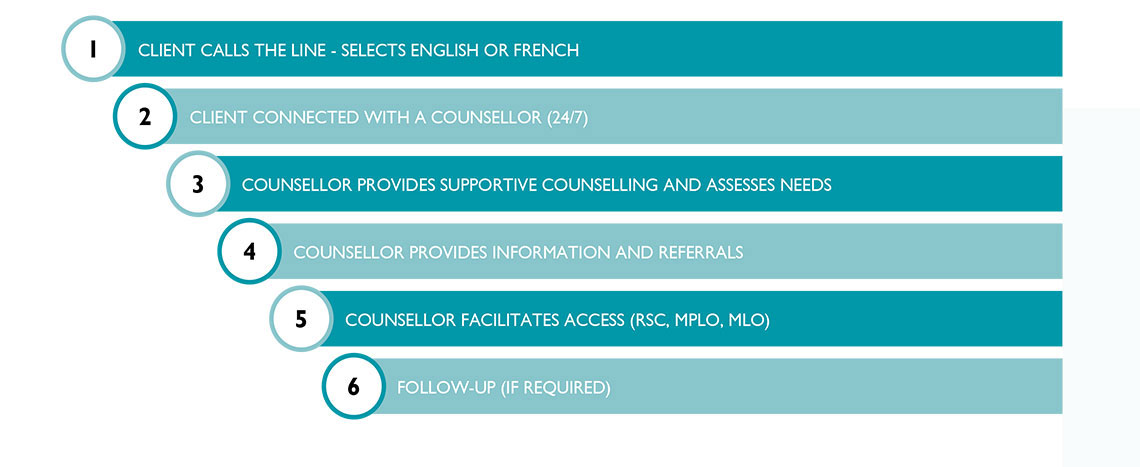
Text version
- Client calls the line, selects English or French
- Client connected with a counsellor (24/7)
- Counsellor provides supportive counselling and assesses needs
- Counsellor provides information and referrals
- Counsellor facilitates access (RSC, MPLO, MLO)
- Follow-up (if required)
24/7 Response and Support Line: Did you know?
- A person can call as many times, for as long as needed and as often as they need
- There is no triage and no limits on calls/e-mails
- The individual's choice is always respected. Counsellors will never pressure someone to report or tell the person what they need to do
24/7 Response & Support Line by the numbers
Figure 2: The number of new cases created in the past four fiscal years. Individuals who choose to remain anonymous, family members, and former CAF members are reported as non-CAF.
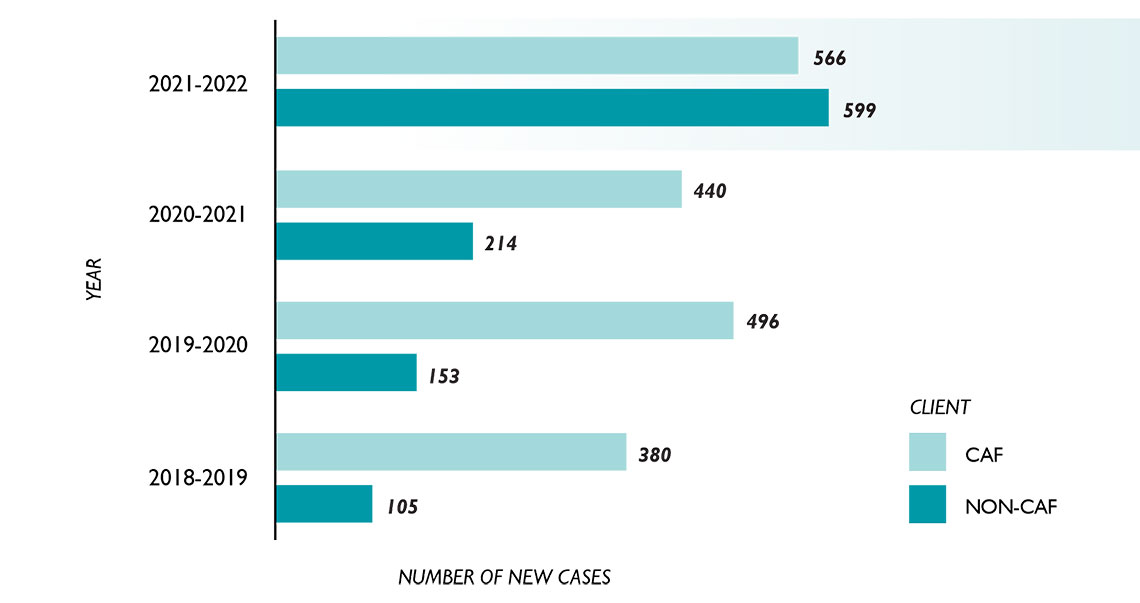
Text version
| Client | Year | Number |
|---|---|---|
| CAF | 2018-2019 | 380 |
| 2019-2020 | 496 | |
| 2020-2021 | 440 | |
| 2021-2022 | 566 | |
| NON-CAF | 2018-2019 | 105 |
| 2019-2020 | 153 | |
| 2020-2021 | 214 | |
| 2021-2022 | 599 |
Figure 3: The number of new cases created each month over the 2021-2022 fiscal year, by CAF membership status.
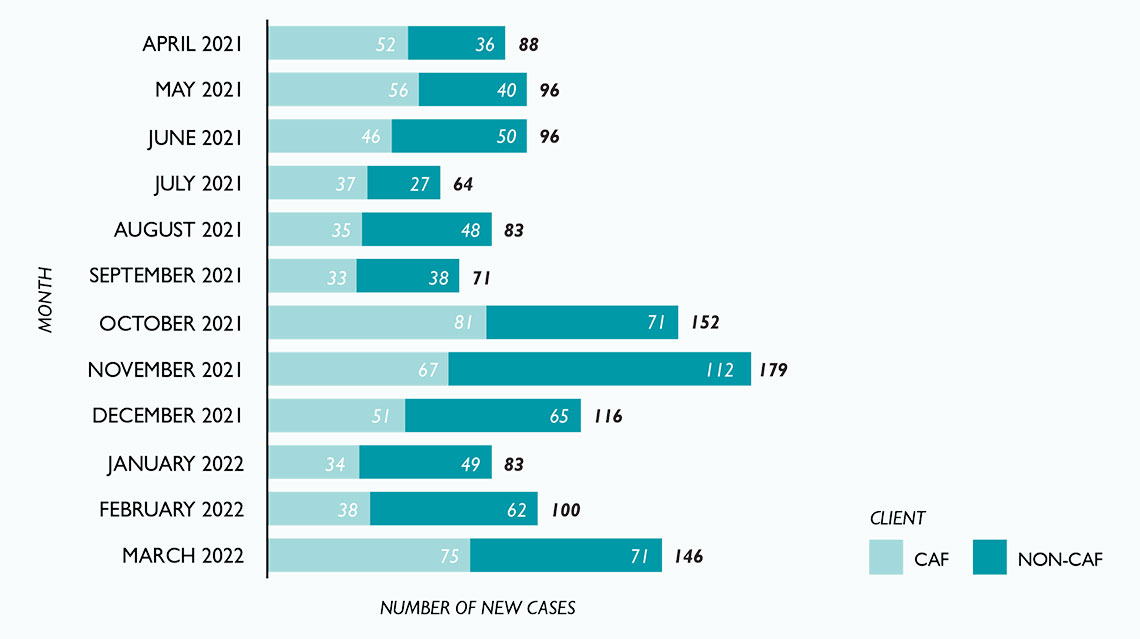
Text version
| Month | April 2021 | May 2021 | June 2021 | July 2021 | August 2021 | September 2021 | October 2021 | November 2021 | December 2021 | January 2022 | February 2022 | March 2022 |
|---|---|---|---|---|---|---|---|---|---|---|---|---|
| CAF | 52 | 56 | 46 | 37 | 35 | 33 | 81 | 67 | 51 | 34 | 38 | 75 |
| NON CAF | 36 | 40 | 50 | 27 | 48 | 38 | 71 | 112 | 65 | 49 | 62 | 71 |
| TOTAL | 88 | 96 | 96 | 64 | 83 | 71 | 152 | 179 | 116 | 83 | 100 | 146 |
Figure 4: Client category for each new case. In this graphic, anonymous callers are reported as Non-CAF.
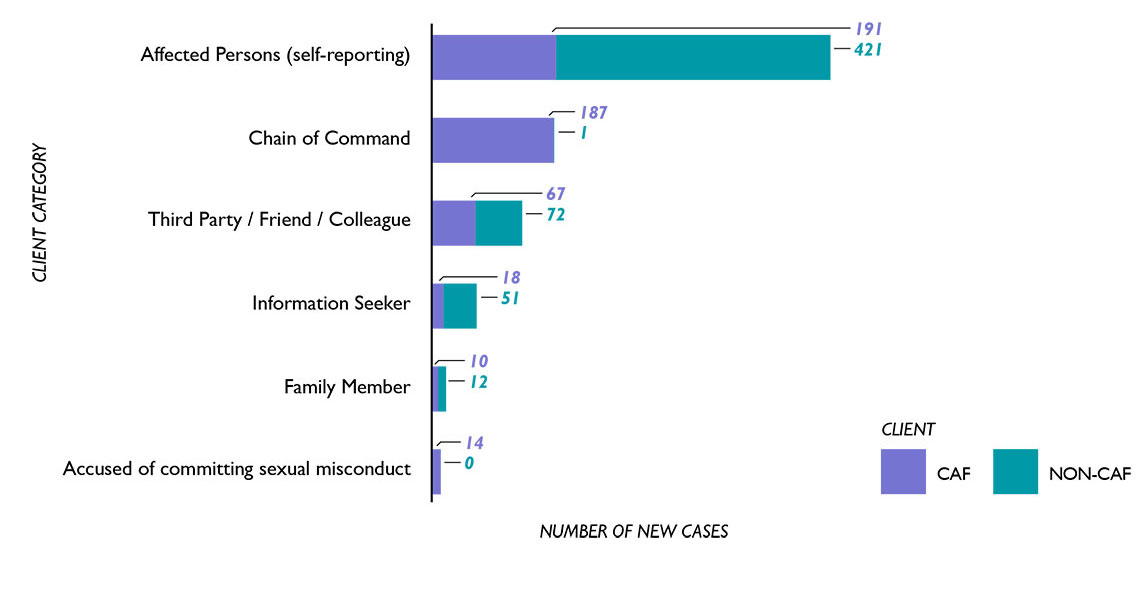
Text version
| Client | Client category | Number of cases |
|---|---|---|
| CAF | Affected Persons (self-reporting) | 191 |
| Chain of Command | 187 | |
| Third Party / Friend / Colleague | 67 | |
| Information Seeker | 18 | |
| Family Member | 10 | |
| Accused of committing sexual misconduct | 14 | |
| Bystander | 6 | |
| NON-CAF | Affected Person (self-reporting) | 421 |
| Chain of Command | 1 | |
| Third Party / Friend / Colleague | 72 | |
| Information Seeker | 51 | |
| Family Member | 12 | |
| Accused of committing sexual misconduct | 0 | |
| Bystander | 1 |
Figure 5: Services provided for each contact.
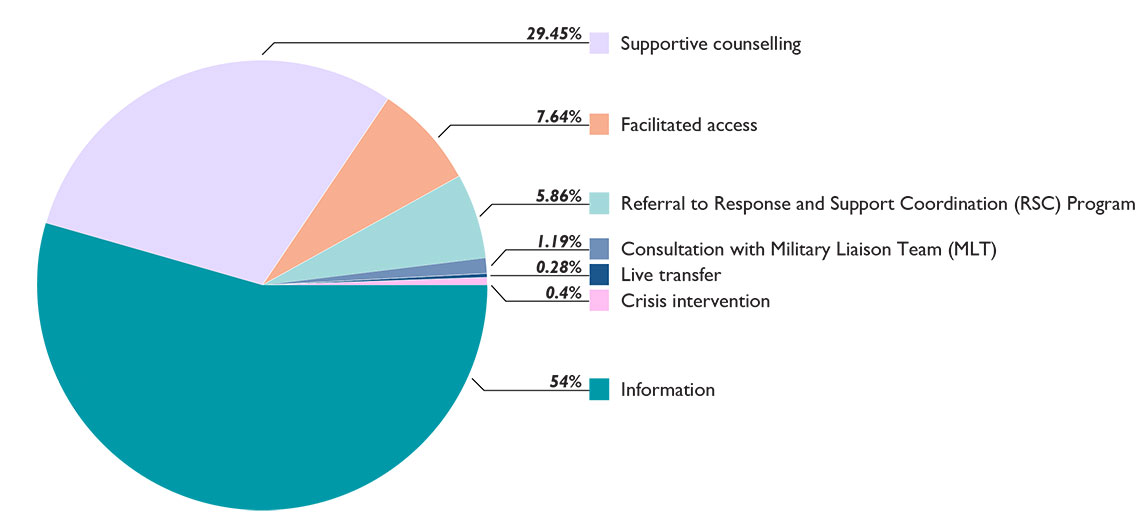
Text version
| Support Provided | Number of contacts (%) |
|---|---|
| Information | 54% |
| Supportive counselling | 29.45% |
| Facilitated access | 7.64% |
| Consultation with Military Liaison Team (MLT) | 1.19% |
| Referral to Response and Support Coordination (RSC) Program | 5.86% |
| Crisis intervention | 0.4% |
| Live transfer | 0.28% |
Figure 6: Reason for contact for new cases.
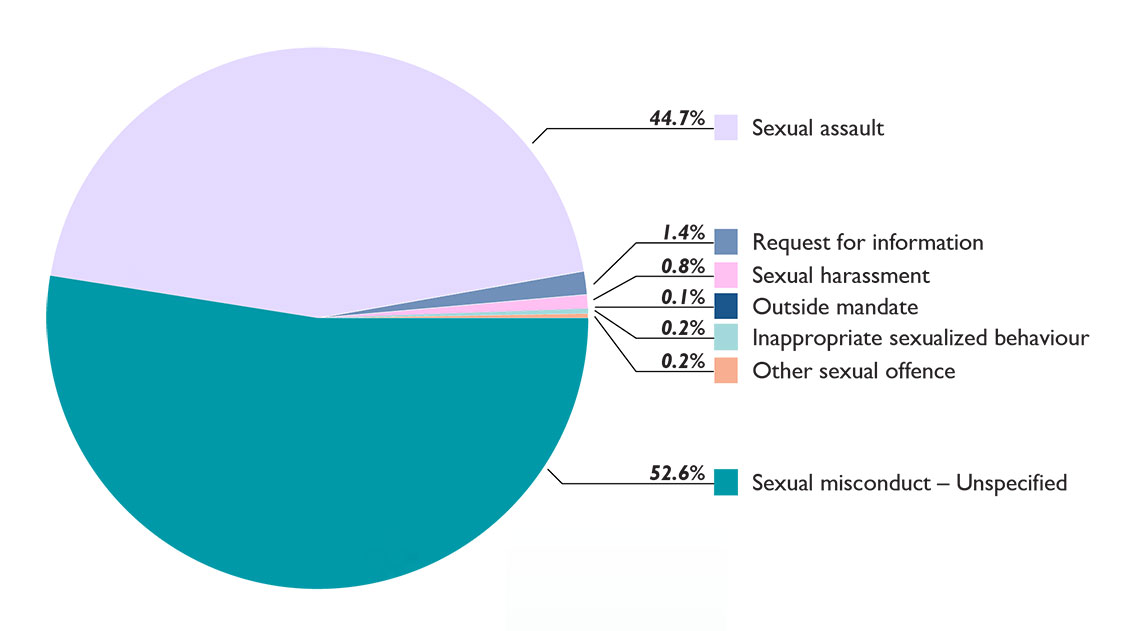
Text version
| Reason for Contact | Number of cases (in percentages) |
|---|---|
| Sexual assault | 44.7% |
| Sexual misconduct – Unspecified | 52.6% |
| Inappropriate sexualized behaviour | 0.2% |
| Sexual harassment | 0.8% |
| Request for information | 1.4% |
| Outside mandate | 0.1% |
| Other sexual offence | 0.2% |
Figure 7: Gender distribution of CAF callers.
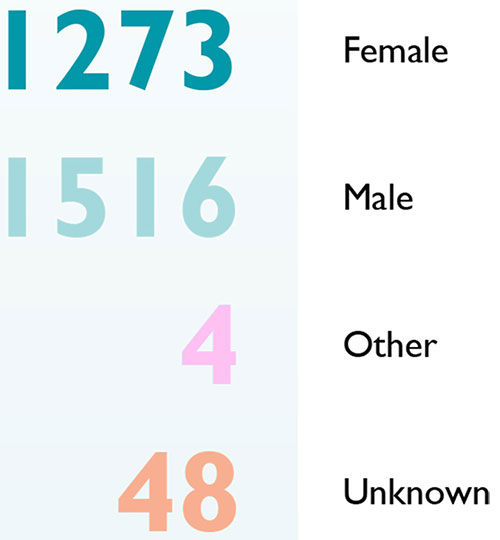
Text version
| Gender | Affected members |
|---|---|
| Female | 1,273 |
| Male | 1,516 |
| Other | 4 |
| Unknown | 48 |
Response and Support Coordination (RSC)
The Response and Support Coordination (RSC) program assigns a dedicated coordinator to each client. The coordinators can provide services including, but not limited to:
- Supportive counselling
- Information and referrals to resources and services
- Advocacy
- Accompaniment to appointments, meetings and proceedings
- Assistance with workplace arrangements
The RSC program charter, signed in 2019 to support the launch of the program, proposed an initial centralized service-delivery model followed by a progressive decentralized expansion to regional locations as resources became available.
The 2021-2022 fiscal year saw the RSC program expand in many ways, with a wider geographical reach, larger client base, additional staff, and increased knowledge and understanding of sexual misconduct and trauma.
In spring 2021, the SMRC received the direction to expedite the decentralization of the RSC program to various regions across the country. This involved the creation of five regions (Quebec, Pacific, Atlantic, Prairies, Ontario) in addition to the existing National Capital Region (NCR).
The direction to open the regional locations as soon as possible resulted in an urgent need to prioritize staffing. An additional 30 coordinators and five to seven supervisors were needed.
In the 2021-2022 fiscal year, the region of Quebec became operational in addition to the existing NCR team. Staffing for the Pacific region was also well underway.
Like the 24/7 Line, the RSC program also expanded to two more client groups in the 2021-2022 fiscal year: DND Public Service employees and former CAF members. The RSC Team has offered services to these client groups since late 2021 and the expanded mandate has been well received by clients. This expansion contributed to the increased volume of new cases and associated activities year over year.
Response and Support Coordination by the numbers
| - | 2020-2021 | 2021-2022 |
|---|---|---|
| # of new cases | 82 | 154 |
| # of times supportive counselling was provided | 868 | 1,499 |
| # of calls/emails with clients | 1,954 | 2,402 |
| # of months (on average) of active involvement with RSC | 6 | 4 |
| # of referrals to Military Police Liaison Officer | 40* | 117 |
| # of referrals to Military Liaison Officer | 70* | 42 |
| # of calls/emails with chain of command | 31 | 77 |
| # of calls/emails with internal and external partners | 280 | 392 |
| # of accompaniments | 0** | 15 |
* As a result of ongoing work to promote data quality, numbers presented in this report may differ slightly from those presented in previous Annual Reports.
** Accompaniments are at zero for 2020-2021 as this service was put on hold due to pandemic restrictions.
Military Sexual Trauma (MST) Peer Support Program
The Military Sexual Trauma Peer Support Program allows those affected by sexual misconduct in the military to give and receive support amongst themselves.
The objectives of the Peer Support Program are to:
- help increase awareness about resources and services available
- increase participants’ sense of empowerment and self-efficacy
- decrease isolation, stigma and shame
- contribute to overall well-being and recovery
In response to the increasing need for more comprehensive support services for those affected by military sexual trauma (MST), Budget 2021 provided funding for a joint DND-VAC peer support program. This program will fill a critical gap to support current and former CAF members who have experienced sexual misconduct during their service.
Members affected by sexual misconduct often describe how the isolation that they experience in trying to access support groups for sexual assault and online peer support through civilian service providers, as specific military aspects of their experiences such as the military culture and institutional response have a significant impact on their lived experience.
Consultations were held with members of the MST community in the fall of 2021 to better understand what the peer support program should look like.
The consultations revealed a strong desire for individualized survivor-centered programming, with a focus on the provision of multiple program format options and flexibility to move between different types of support.
The consultations highlighted the following items of importance to the MST community to be considered in the development of the peer support program:
- A variety of programming, one-on-one; group; online; in-person; telephone, with flexibility to move between the different programs
- Programming that is safe, confidential, inclusive, discreet, diversified, and independent from the chain of command and rank structure
- Careful selection, screening, support, and training for peer supporters
- Peer supporters with knowledge/experience of the military environment, who are compassionate, empathetic, mentally fit, accepting of others, and trauma-informed
- An effective matching process between peers and peer supporters
- Consideration of potential barriers to accessing MST Peer Support including stigma, shame, guilt, fear of reprisal, lack of confidence in the program and concern for military involvement
- Broad communication, promoted by CAF leadership, fostering dialogue and prevention and reducing silence, fear, shame and stigma
Following the consultations, program development moved forward, and a model was created to guide the implementation.
Figure 8
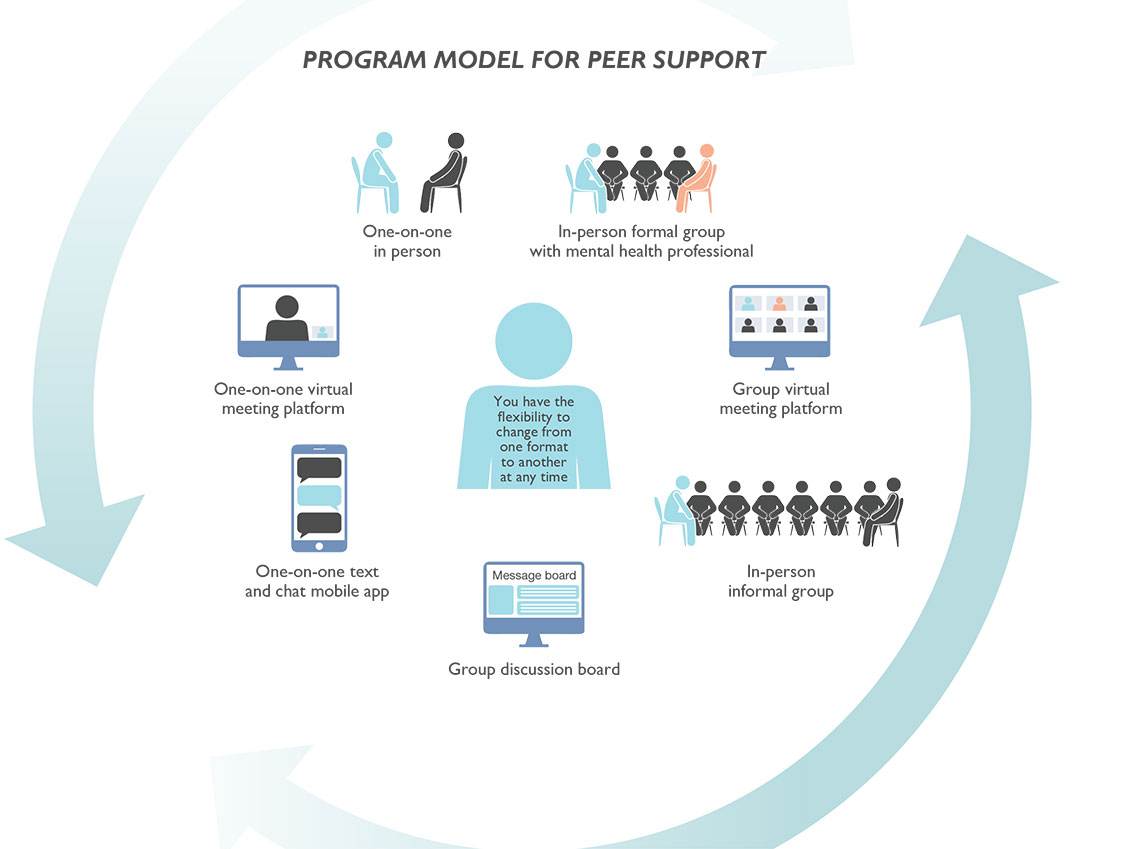
Text version
Program model for peer support
- One-on-one virtual meeting platform
- One-on-one in-person
- In-person formal group with a mental health professional
- Group virtual meeting platform
- In-person informal groups
- Group discussion board
- One-on-one text and chat mobile app
Participants will have the flexibility to change from one format to another at any time.
To ensure the safety of participants and the screening, hiring and training of peer supporters, the MST Peer Support Program will be launched using a phased approach starting with an online peer support discussion board in June 2022.
Restorative Engagement (RE) Program
Restorative Engagement provides opportunities for persons who have experienced sexual misconduct to share their experience, the impacts and/or their knowledge, ideas and insights about what needs to change to prevent and respond to sexual misconduct. The RE program also presents opportunities to build the knowledge, skills, and capacity of leaders within the institution necessary for the required culture change.
The Restorative Engagement (RE) program was a major priority for the SMRC in 2021-2022. As a key component of the SMRC’s support services, the RE program aims to support class members in sharing their experiences and insights related to sexual misconduct with CAF/DND leaders (Defence representatives) and to empower them to contribute to improving institutional responses to sexual misconduct and changing the culture that fosters it.
The program was developed as a result of the 2019 CAF-DND Sexual Misconduct Class Action Settlement, referred to as the Final Settlement Agreement (FSA). The FSA included an option for class members to take part in an RE Program (Schedule K).
Through consultations held in 2020 and 2021, class members expressed their desire to be involved in meaningful and empowered ways throughout the RE program. They have identified the importance of facilitating access to the program and ensuring flexible options to have their experience of sexual misconduct meaningfully heard and acknowledged through responses that meet their needs and actively contribute to culture change within the DND and the CAF.
The RE program was launched on 15 November 2021 with an approved two-phased implementation strategy. The intention of a two-phased rollout was to take a responsible and deliberate approach to establishing the RE program, processes, and services, creating an agile space to validate the design and allowing for robust reviews and course corrections prior to the official launch.
The first group of class members contacted to participate was kept small to allow time and space to pilot the model while ongoing program processes, documentation and supports are being finalized based on feedback. There were 92 class members contacted between November 2021 and March 2022.
The RE Program was established to allow all eligible claimants with the opportunity to participate over a five-year period. Over 5,000 class members are now expected to go through the program, over 2,000 more than was originally planned.
What does participation look like for class members?
Each class member in the RE program is assigned a restorative practitioner as a consistent point of contact throughout their engagement. The practitioner will remain with the class member throughout their participation in RE.
Engagement may include one or more of the following:
- an individual engagement with a defence representative. This may be done virtually or in person
- an individual engagement by providing a submission to be shared with Defence representatives (for example, audio recordings, videos, letters, statements, art, etc.) with or without requiring a response from a defence representative
- a group engagement with other class members with one or more Defence representatives
- a group engagement with other class members only
As part of their engagement, class members may share any or all the following, to any degree they are comfortable:
- Personal experiences of sexual misconduct
- How it was or was not responded to
- Harms they suffered
- Impacts it has had on their lives
- Thoughts about the causes of sexual misconduct and what needs to change to prevent and better respond to it
Defence representative cohorts
Defence representatives are members of the CAF and DND public service employees selected for their formal and informal leadership roles within the institutions and nominated to take part in RE in order to carry out culture change. They represent the institution through a variety of experiences, ranks, areas of work, and identities. As part of their engagement, Defence representatives commit to:
- developing the knowledge and skills needed to engage restoratively
- listening, acknowledging and learning from class members’ experiences
- taking responsibility on behalf of the institution for responses to sexual misconduct and its contexts and causes
- identifying and taking action at the individual, collective and institutional levels to contribute to culture change to address and end sexual misconduct
Restorative practitioners facilitate the participation of Defence representatives in small groups called cohorts. Three inaugural cohorts began in January 2022, with a total of 24 Defence representatives. The RE program presents valuable opportunities for Defence representatives to build the knowledge, skills, and capacity to carry out culture change.
A restorative approach to addressing sexual misconduct
A restorative approach is a principle-based approach to addressing harm that puts people and their relationships at the centre. Originating from Indigenous cultures and practices, a restorative approach has been applied to educational environments, the criminal justice system, and communities. A restorative approach does not mean a particular practice, model or tool for repairing harm. Instead, a restorative approach is a way of engaging using restorative principles to address the root causes of harm and prevent further harm from happening.
Key facts about Restorative Engagement
Participation in RE is:
Safe
All engagement processes are facilitated in a trauma-informed way by trained restorative practitioners. Participants work with restorative practitioners to prepare for engagement sessions and class members make choices about how they participate including the possibility of anonymity.
The program does not facilitate communication between individuals harmed and those who harmed them. Instead, it involves representatives of the institution in which the harm occurred.
Confidential
Participation in, and information shared within the RE program will be confidential within legal limitations. All personal information is handled in accordance with the Privacy Act.
Outside CAF
The program is outside the CAF chain of command and the investigation process. Participation in the program is not part of any administrative, disciplinary or criminal process.
Voluntary
Participation is on a voluntary basis only, and participants are free to change their mind at any step.
Contribution Program
The SMRC's Sexual Assault Centre Contribution Program funds projects from civilian sexual assault centres located near nine of the largest Canadian Forces bases. The Program looks to address gaps in support for the CAF community by enhancing access to survivor support services.
In 2021-2022, recipients of the contribution program continued their important work with the CAF community. A total of 152 initiatives were developed and implemented in seeking to address gaps in support. The following table provides some examples of the projects that were funded throughout the year.
Individualized Canada-wide online counselling has been made available to masculine-identified survivors of sexualized violence and couples.
| Sexual Assault Centre | Project Title | Examples of Initiatives Implemented this FY |
|---|---|---|
| Huronia Transition Homes | Building Accessible Supports and Education | Delivered a public education workshop on Base Borden in November |
| Sexual Violence New Brunswick (SVNB) | Navigating Systems: Working Together to Support Survivors of Sexual Assault | Facilitated a presentation for Gagetown Base Mental Health on SVNB and its services, which included the creation of promotional material. |
| Sexual Assault Centre of Kingston | Another Crossing: Building Bridges Between CFB Kingston and Resources for Sexual Violence | Participated in a knowledge exchange event with the Kingston Military Family Resource Centre. |
| Sexual Assault Support Centre of Ottawa (SASC) | Empower #MeToo; Supporting Canada’s Defence Community | Launched a one-month social media campaign specific to the CAF community survivors between March and April 2021, and more than 64 informative posters have been shared with survivors through SASC social media and the results have been steady increase in followers in all our social media handles. |
| Women's Sexual Assault Centre of Renfrew County | Confidential Support for Survivors of Sexual Violence from the CAF Community | Hosted workshops for Health Promotions and Petawawa Military Family Resource Centre on disclosures and self-care Hosted a Journaling for Survivors workshop to demystify the concept of journaling for healing. Hosted Queer and Trans positive language and safe space training. |
| Men's Therapy Centre | You Are Not Alone | Launched a Psychoeducational Trauma group in October 2021 with four survivors of sexualized violence piloting the program. |
| Sexual Assault Centre of Edmonton | Sexual Violence Support and Education for the CAF Community | Completed consultations with the mental health teams at both CFB Edmonton and CFB Cold Lake. Created tailored sessions for CFB Edmonton and CFB Cold Lake mental health teams. |
| Avalon Sexual Assault Centre | Halifax Sexual Assault Community Support Network | Provided trauma-specific therapeutic counselling to survivors of sexual violence. |
| Viol-Secours | Let us join forces | Presentation of our services to various resources (Military Family Resource Centre, OSI Clinic, Veterans Foundation, etc.) Participate in the Canadian Community of Practice Symposium Series on Military Sexual Trauma. Create tailored training for the different CAF services (peer supporters, support professionals, etc.) |
With the contribution program expiring at the end of fiscal year 2022-2023, the SMRC's goal for 2021-2022 was to transition from contributions to grants to expand the program and broaden its organizational and geographical reach to better meet the needs of underserved communities. Funding for a grant program was approved in winter 2021. This program will fund projects from not-for-profit Canadian, community-based service providers with the capacity and expertise to provide services and initiatives for those affected by sexual misconduct in the wider defence community such as, but not limited to, sexual assault centres and online platforms.
Military Liaison Team (MLT)
Embedded in the SMRC, the Military Liaison Team (MLT) provides a direct connection to the CAF to ensure unity of purpose and action and effective implementation of the CAF's response to sexual misconduct.
The MLT consists of Military Liaison Officers (MLO) and Military Police Liaison Officers (MPLO) from the Canadian Forces National Investigation Service (CFNIS).
MLO
- Deals with non-criminal matters
- Responds to CAF members' questions on military policies, processes and procedures
- Guidance and support for Chain of Command
- Facilitates communication amongst the SMRC, Director General Professional Military Conduct (DGPMC), the Vice Chief of the Defence Staff Group (VCDS Gp) and other Level 1 Staff
- Advises the SMRC on CAF culture, trends, policies and procedures
MPLO
- Deals with criminal matters
- SMRC's primary point of contact for the CFNIS
- Provides information to affected persons on reporting, investigation and justice procedures
- Advises the SMRC on military/civilian justice processes as it relates to sexual offences
Demand for MLT advisory services increased significantly in 2021-2022 as the SMRC added new programs and expanded existing ones to new client groups. The MLT received 293 referrals from 1 April 2021 to 31 March 2022, an increase of 13% from the last fiscal year. Referrals come from several sources including the 24/7 Response and Support Line, the RSC program, and the RE program.
The MLT actively participates in SMRC outreach events, most of which were held virtually in 2021-2022 due to ongoing COVID-19 restrictions. The MLT also supported the Restorative Engagement Program through its design and development stage and November 2021 launch to the first cohort.
Military Liaison: Did you know?
Military members do not have access to the SMRC's confidential client information. While the CAF receives regular reports from the SMRC on the number and nature of calls, the CAF chain of command does not have access to the confidential information in the database. In addition, CAF members can speak to an MPLO anonymously to obtain information on whether the incident they experienced meets the threshold for an offence under the Criminal Code of Canada, and on the investigative process itself, to help them make an informed decision about reporting.
Training and Education
The SMRC provided a wide range of training programs and educational materials to help Defence Team members prevent, respond to and support persons affected by sexual misconduct.
Scenario-based e-learning platform
In 2021-2022, the SMRC's Training and Education Team continued development of a scenario-based e-Learning Platform (formerly named The Immersive Learning Platform), an online training environment that features self-paced activities to allow CAF members to practice skills related to professional conduct and culture. Following final review and testing phases, the platform is set to launch on the Defence Learning Network (DLN) 3.0 in the fall of 2022.
Building Our Future
The Training and Education Team resumed work towards the implementation of the Building Our Future program, which targets military college and early career CAF training environments. It is based on research showing that young adults continue to develop personality, intellectual functioning, moral reasoning, decision-making, impulsivity, coping, and problem-solving well into their twenties.
TWhen the implementation of Building Our Future was paused due to COVID-19 restrictions in 2020-21, the Training and Education team used the opportunity to review and update the program content and identify components of the program that were directly impacted by the culmination of Operation HONOUR.
Respect in the CAF
The Respect in the CAF (RitCAF) workshop was updated following the culmination of Operation HONOUR, and the refreshed version was launched in September 2021. It was delivered to 650 participants in 2021-2022.
Expert Policy Advice and Research
The Policy team provides expert advice, research services and fosters cross-sector collaboration to support the delivery of all the SMRC's programs and services.
The Policy team was expanded in 2021-2022, and was active in the following programs and initiatives throughout the year:
Survivor Support Consultations
TSchedule N to Final Settlement Agreement (FSA) to the CAF-DND Sexual Misconduct Class Action calls for the establishment of a Survivor Support Consultation Group (SSCG). The SSCG brought together three class member representatives and three DND/CAF representatives who started meeting in the previous fiscal year. Their work was supported by three external subject matter experts. The SMRC served as the Secretariat to the SSCG and the SMRC's Executive Director took part in the SSCG as one of the three DND/CAF representatives.
TThe aim of the SSCG was to ensure that those affected by sexual misconduct could, through class members, directly influence the institution's policies, programs, and services to respond to sexual misconduct and to support survivors.
The SSCG released a Summary Report describing its work and findings on 21 December 2021, along with the DND/CAF's response to the Report. The Report identified three principles, five themes, 10 goals and 45 recommendations aimed at enhancing survivor support and the development of a stakeholder engagement framework. The five themes around which the Report's proposed goals and recommendations were organized were:
- Engagement, partnerships, and research
- Support, especially to address service gaps
- Training
- Communication and information
- Accountability
Through its response to the Report, the DND/CAF:
- acknowledged the Report's recommendations and themes, including the central message that culture change and survivor support are linked, and that work on one cannot proceed without work on the other
- affirmed their intent to use the Report to help guide transformational culture change effort
- committed to using the Report to guide follow-on engagement with external experts, community-based partners, academics, researchers, and others with expertise on issues central to supporting diverse groups of survivors
- set out examples of key areas where work is already underway on a number of the recommendations
- committed to establishing an integrated plan to implement all remaining recommendations from other external comprehensive reviews, including the report of the Third Independent Review of the National Defence Act and the Independent External Comprehensive Review led by The Honourable Louise Arbour
The SMRC has already started to undertake work to implement the recommendations in the Final Report that fall within its mandate, including those that relate to initiatives that received commitment in Budget 2021. Further action will be taken in relation to other recommendations moving ahead, while ensuring that survivors' voices and views are sought, considered, and reflected. The Chief of Professional Conduct and Culture is leading work to integrate the Report recommendations within departmental activities.
Stakeholder Engagement Framework
In winter 2022, Partnership and Engagement began the development of a Stakeholder Engagement Framework to guide the SMRC’s interaction with internal and external partners. The framework is driven by feedback from the lived experience community, specifically the Survivor Support Consultation Group report. As the framework development continues, it will be crucial to remain sensitive to the potential for consultation burnout, and to ensure that those being consulted on an ongoing basis are a representative sample of SMRC partners, including academic experts, Defence Team subject matter experts, advocacy groups, and people with lived experience, with an explicit focus on fostering representation for equity-seeking and disproportionately impacted communities.
External Advisory Council
The External Advisory Council (EAC) on Sexual Misconduct provides independent, third-party advice to the Executive Director/Chief Operating Officer of the SMRC on their response and initiatives to address and eliminate sexual misconduct in the CAF. The members of the EAC were chosen for their experience, knowledge and ability to advise on various aspects of sexual misconduct such as victim services, advocacy and the assessment and treatment of offenders. Members are not paid for their time or advice; they are reimbursed for related expenses in accordance with Treasury Board guidelines.
Strategic Policy and Planning
Bill C-77
Bill C-77, an act to amend the National Defence Act and to make related and consequential amendments to other Acts, received Royal Assent in 2019 and came into force 20 June 2022. The legislation adds a new division, entitled Declaration of Victims’ Rights (DVR), to the Code of Service Discipline. The DVR will provide victims of service offences with rights to information, protection, participation and restitution, as well as a complaint mechanism for when they believe their rights have been infringed. It also provides for a Victims’ Liaison Officer to help ensure victims are properly informed and in a position to exercise their rights, by explaining the procedures regarding investigations, charges and convictions and by obtaining information requested by the victim to which they are entitled to under the DVR. Throughout 2021-2022 the SMRC continued to work with the Office of the Judge Advocate General to provide guidance and advice on the drafting of the regulations and policies as well as the training requirements related to the DVR’s implementation.
Parliamentary appearances
In 2021-2022, interest in the issue of sexual misconduct in the CAF remained a focused topic in the House of Commons. With allegations of sexual misconduct surfacing against several senior CAF officers, two separate House of Commons Committees began studies on sexual misconduct in the CAF. The Defence Committee (NDDN) and Status of Women Committee (FEWO) continued their studies on sexual misconduct in the CAF. Even though the two committees interviewed many of the same witnesses, NDDN focused more on accountability at various levels while FEWO focused more on the experiences of those in the CAF who have experienced sexual misconduct. FEWO tabled its report in the House of Commons on 17 June 2021. Dr. Preston and Acting Executive Director Shoba Ranganathan appeared before both committees to provide expert testimony on the services and programs offered by the SMRC.
Quality management
The Quality Management Team is a new initiative for the SMRC. Two fundamental elements of a quality management system are currently being planned.
The first of these is Quality Planning, to identify relevant quality standards and determine how to accomplish them. The goal is to align services and service delivery processes with industry standards and International Organizational Standards (ISO) Quality Management Principles, thereby enhancing the ability to identify, measure, maintain and report on the effectiveness of services.
The second is an Incident Management System, to enhance the SMRC’s ability to detect, respond, manage and mitigate risks associated with unexpected situations that negatively affect the quality of SMRC services. The goal of the Incident Management System is to make improvements to prevent recurrence and contribute to the continuous quality improvement of SMRC services.
Responsive Legal Options
Budget 2021 outlined investments to expand the SMRC’S support services, including the initiation of new programs to provide victims with access to free, independent legal advice and reporting options for CAF members that do not trigger the duty to report. In fiscal 2021-2022, a dedicated team was created to work on program development and implementation.
Independent Legal Assistance
Upon further analysis, it was determined that an interim program that would reimburse the cost of legal expenses was the most practical option for meeting the immediate needs of victims as part of a shorter-term delivery approach. Options for a permanent program model would be developed with the intention to engage stakeholders and people with lived experience on program design and rollout.
Alternative Reporting Options
A review of existing alternative reporting programs for victims of sexual misconduct, both across Canadian jurisdictions and allied armed forces, was conducted. Cognizant of efforts underway to improve reporting misconduct, namely through the Chief Professional Conduct and Culture’s work on simplifying and enhancing misconduct reporting mechanisms, the SMRC took pause to consider how best to work collaboratively on the issue across CAF/DND.
Survey on Sexual Misconduct in the CAF (SSMCAF)
In 2021-2022, the SMRC collaborated with Statistics Canada to prepare for the launch of the third cycle of the Survey on Sexual Misconduct in the CAF (SSMCAF). Conducted by Statistics Canada on behalf of the CAF and DND, the purpose of the SSMCAF is to collect information about the prevalence and nature of inappropriate sexual behaviour within the military, the reporting of inappropriate sexual behaviour to authorities, military members' perception of the Canadian Armed Forces' (CAF) response to this issue, and CAF's progress in addressing sexual misconduct in the ranks.
Communications and Marketing
The Communications and Marketing team provides strategic communications advice and support to all programs and services offered by the SMRC. It also works to inform current and former CAF members and DND public service employees about the SMRC's programs, services and activities.
Social media
On social media, the SMRC had an existing social media presence on Twitter and LinkedIn. Notably, the organization's Twitter following grew by 284 followers in 2021-2022, reaching a total of 595 followers (541 English and 54 French). On LinkedIn, the SMRC had approximately 8,500 impressions on 289 posts.
To help reach a broader audience, a new Facebook account was created in early 2022.
Outreach
To raise awareness of the SMRC's programs and services, the Communications and Marketing Team hosts two types of sessions: SMRC 101 and Trauma-Informed Care. These sessions, presented in collaboration with representatives from the 24/7 Response and Support Line team, provide tools and resources for leaders as well as information for those who have been affected by sexual misconduct and those who support them. A total of 43 sessions were delivered to over 1,000 DND/CAF members and the Defence community in 2021-2022. All sessions were held virtually due to COVID-19 restrictions.
Web
The SMRC web presence is the main source of information, tools, resources and information for those affected by sexual misconduct and those who support them. In 2021-2022 the SMRC's English and French web content had a combined total 27,188 visitors and 47,899 page views. The Communications and Marketing team conducted usability testing in 2021-2022 to ensure the SMRC's web content is accessible and follows usability guidelines.
What's next?
The growth that marked 2021-2022 for the SMRC stretched the organization in many ways. As 2022-2023 began, staff were navigating the organizational repercussions of the SMRC's rapid expansion, a change in leadership with the retirement of long-time Executive Director Dr. Preston, and the impact of the recommendations contained in the Report of the Independent External Comprehensive Review.
With the expanded mandate of the SMRC resulting from the increased funding allocated through Budget 2021, more staff have been and will continue to be needed to increase capacity to deliver new and expanded programs.
The overall organizational footprint and complexity have also increased. As a result, SMRC's current corporate functions are not adequately resourced to address the financial and staffing complexities brought forth by the new, high priority programs.
Following the retirement of Dr. Denise Preston in April 2022, Acting Executive Director Shoba Ranganathan stepped in on an interim basis. In August 2022, Linda Rizzo Michelin was appointed as the Chief Operating Officer of the SMRC to lead the organization going forward.
SMRC's key program priorities for 2022-23 include:
Expansion of Programs and Services
The expansion of the SMRC's programs and services to more client groups and geographic areas is underway and will continue throughout the coming year. The 24/7 Response Line and the Response and Support Coordination teams need to continue to hire and train additional resources to effectively support this expansion.
Restorative Engagement
Response to the RE Program has exceeded expected numbers. The SMRC anticipates more than 5,000 class members will go through RE from 2022-2026.
The RE Program will continue to actively recruit, hire and onboard restorative practitioners across the country to scale up the RE program to Final Operating Capacity (FOC).
The RE team will continue to work collaboratively with internal and external stakeholders (including external subject matter experts) to refine and complete the program design. During the Initial Operating Capacity (IOC) stage, comprehensive lessons learned activities will be conducted to identify gaps and successes and integrate these learnings into program design and delivery. All learnings during the year-long IOC launch of RE will inform the Final Operating Capacity (FOC) launch of RE.
Peer Support Program
The next steps in the Peer Support Program rollout include finalizing all program documents, consent forms, and operating procedures, as well as recruiting and training the peer supporters to launch the various phases of the program.
Independent Legal Assistance
Initial Operating Capability (IOC) for the Independent Legal Assistance Program will be developed. Planned launch in 2022-2023, it will provide reimbursement of victims' legal expenses via ex gratia payments. Ministerial authority has been obtained to enable this implementation.
To reach Full Operating Capability, work will continue throughout 2022 and into 2023 to identify and present options for delivery to senior leadership for further direction and Treasury Board for approval.
Grant Program
The Sexual Assault Centre Contribution Program will transition to the Community Support for Sexual Misconduct Survivors Grant Program to increase access to funding.
Changes include:
- the creation of two types of grants: project-based (maximum of $50,000) and recurrent funding (maximum of $75,000 annually)
- increased eligibility to all community-based service providers
- expanded eligibility to all regions in Canada
Research and Prevention
SMRC will continue working with Statistics Canada on the next iteration of the CAF Sexual Misconduct Survey, to be administered in 2022-2023.
The newly established Research team will also begin consultations with internal and external stakeholders to develop a research work plan.
The Prevention team has several research projects underway that will inform prevention initiatives going forward. Preliminary results from the Perpetrator Study data analysis will provide critical information on sexual misconduct within the CAF that is currently missing. In addition, the first comprehensive evaluation plan of a prevention program within the CAF (Building Our Future) will be finalized.
Report of the Independent External Comprehensive Review
The Report of the Independent External Comprehensive Review (IECR) of the Department of National Defence and the Canadian Armed Forces was published in May 2022.
Following the publication of the IECR, the Minister of National Defence (MND) announced that she welcomed all recommendations in Mme Arbour's report, and that work will begin to implement 17 of the IECR's recommendations – either through new efforts, or by strengthening existing programs already underway.
Of the 17 recommendations initially accepted by the MND, there are six that directly implicate the SMRC: recommendations 12, 13, 14, 15, 17 and 18. As requested by the External Comprehensive Reviews Implementation Committee (ECRIC), SMRC has submitted briefing notes and supporting materials outlining its response to each recommendation.
In conclusion
Since 2015, the SMRC has been dedicated to supporting those affected by military sexual trauma. Over the years, the organization's work has helped countless affected individuals and provided invaluable insights and guidance to the Defence Team.
As the CAF and DND work to address sexual misconduct and ultimately change the culture that has enabled it, the SMRC remains fully committed to responding to the emerging needs of those affected through support, resources, consultation, and research.

